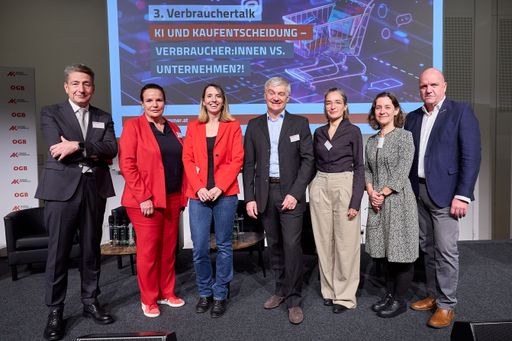“Artificial intelligence – AI – covers almost all areas of life. For us, it is important that this AI has a supportive effect on people,” said AK Lower Austria President and ÖGB Lower Austria Chairman Markus Wieser at the 3rd consumer talk “AI and decision – consumers vs. companies?!” of the AK Lower Austria. “It is very clear to us as employee representatives: consumer protection and progress are by no means mutually exclusive, but clear rules are needed,” demanded Wieser on Tuesday in St. Pölten.
Above all, we need transparency and fairness. It’s about protecting consumers, “because today AI-generated fake shops are almost better than the originals and the infamous “nephew tricks” even use the real voice of the nephew with the help of AI.” “In contrast, we need clear guidelines and protective mechanisms to strengthen consumers’ rights. Today’s event is intended to contribute to this, Wieser concluded.
The expert lectures began with FH Prof. Dipl.-Ingin Mag.a Marlies Temper, Bakk. The deputy head of the computer science and security department at the St. Pölten University of Applied Sciences gave a presentation on the topic of “Algorithmic decision-making through AI”. The head of the Data Intelligence and Data Science and Business Analytics study year referred to the technology behind artificial intelligence. “AI is mathematics made useful. Algorithms, i.e. “cooking recipes”, are used to calculate probabilities. But an AI is never 100 percent accurate. If my navigation system says, “Now turn right” and I realize that my car is wider than the alley, then I still shouldn’t drive in.”
Mag.a Louise Beltzung from the Austrian Institute for Applied Telecommunications ÖIAT spoke about “Artificial Intelligence in Consumer Practice”. Sales are about “anticipating” what someone might want to buy in the future. Personalization and segmentation generated from AI help companies do this. “AI computer mice” or AI toothbrushes that are equipped with sensors for health data are currently being offered. However, it is largely unclear whether such AI tools will become established.
Dipl.-Ing. gave a lecture on “technical opportunities versus ethical limits of AI”. Dr. Dr. Erich Prem. The computer scientist, philosopher and lecturer at the TU and University of Vienna also founded Eutema – an international technology and RTD strategy consultancy. “AI systems are always systems of the past; they are trained with past data. Just because in the past almost all engineers were men, that doesn’t mean that it is – or should be – like that today or in the future. There is a massive power shift taking place. It’s about who gets to decide. If I buy a Tesla, Mr. Musk can simply turn it down if I violate certain requirements. This means: There is a need for a reassessment of the fundamental changes triggered by digitalization, a demand for minimum rights to products and services and a social debate and clarification of individual and social minimum standards.
Univ.-Prof. Dr. Nikolaus Forgó, head of the Institute for Innovation, Digitalization in Law at the University of Vienna, gave a lecture on the topic “Towards regulated artificial intelligence: challenges and perspectives”. Forgó, who is also a member of the Austrian Data Protection Council and the Federal Government’s AI Advisory Board, referred to technological leaps in development: from personal computers to social media to AI. He referred to the risks of using AI in more and more areas of life and the legal handling of the consequences of using AI. Incidentally, like most important technological innovations, ChatGPT did not originate in Europe. In Europe there is the “AI Act”, but it does not address the military use of AI or the energy consumption of AI.
In addition to the experts Beltzung, Temper, Forgó and Prem, Mag.a Daniela Zimmer, digital consumer protection expert at AK Vienna, also took part in the subsequent panel discussion. The focus of the discussion was the opportunities and possibilities of AI. What was required was: better access for consumer advocates to internal company logarithms, better enforcement of existing data protection regulations and reduced Europe’s dependence on the clouds of AI giants – primarily in the USA.
